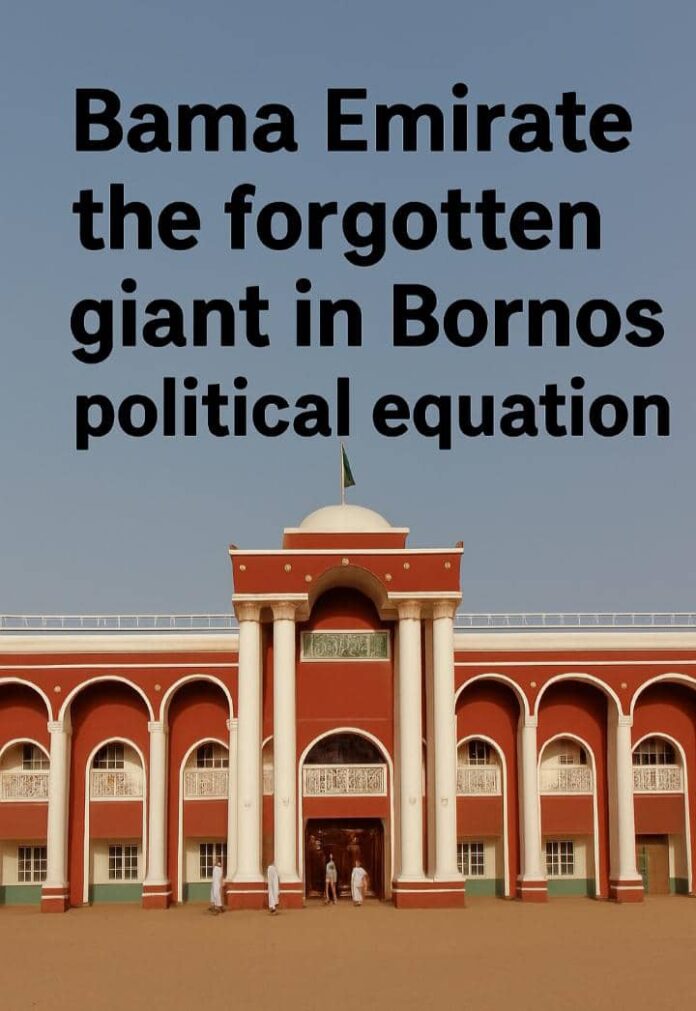By Dr Grema Kyari
Preamble
For centuries, Bama Emirate has stood tall as one of the most historic and strategic centres of civilization, culture, and governance in Borno State. It is an emirate blessed with a proud lineage of leadership, men and women of intellect, and a population renowned for their resilience, loyalty, and service to the state and nation.
Yet, in the current political structure of Borno, Bama Emirate — once regarded as the second most influential emirate after Borno — appears to have been pushed to the margins of representation and decision-making.
The caption “Bama Emirate: The Forgotten Giant in Borno’s Political Equation” reflects not only a sentiment of neglect but also a factual imbalance in the distribution of political power and opportunities across the emirate councils of the state.
Background and Context
Borno State, the epicentre of the Kanem-Borno civilization, comprises several emirate councils — Borno, Dikwa, Bama, Biu, Gwoza, Askira, and Shani — each with its own administrative and historical significance. These emirates form the traditional foundation of governance that continues to influence political and socio-economic affairs across the state.
However, a closer look at the spread of political representation and executive appointments reveals a glaring inequality that undermines the spirit of fairness, inclusion, and unity among these historic institutions.
Statistical Overview of Representation
1. Borno Emirate Council
15 Local Government Areas (LGAs) under its jurisdiction.
Holds the positions of Vice President, Governor, one Senator, one Federal Minister, and five Members of the House of Representatives.
This emirate clearly dominates the political and administrative scene, enjoying the highest concentration of both elective and appointive offices.
2. Dikwa Emirate Council
Comprises 3 LGAs.
Has two Members of the House of Representatives and the Secretary to the State Government (SSG).
Despite its small size, Dikwa Emirate maintains visible representation at both the state and national levels.
3. Bama Emirate Council
Consists of one LGA, yet it is the second largest in population and landmass after Borno Emirate.
Currently, Bama Emirate has no Senator, no Member of the House of Representatives, and no SSG.
Ironically, Bama has produced seven Permanent Secretaries and numerous senior public servants, military officers, and technocrats in the last decade — clear proof of the emirate’s human capital strength and contribution to governance.
Despite these credentials, the emirate remains politically underrepresented, with its voice conspicuously missing in the corridors of power.
4. Biu Emirate Council
Encompasses 4 LGAs.
Holds the office of the Deputy Governor and has two Members of the House of Representatives.
Representation is proportionate and reflects balanced inclusion.
5. Gwoza Emirate Council
Covers one LGA.
Enjoys one Senator and one Member of the House of Representatives.
A model of equitable representation for a smaller emirate.
6. Askira Emirate Council (Shared with *Uba* Emirate)
Shares one LGA (Askira-Uba) between two Emirs — a unique structure in Borno.
Has no Senator and no Member of the House of Representatives.
7. Shani Emirate Council
One LGA, with no Senator and no Member of the House of Representatives.
The Imbalance and the Bama Paradox
From the statistics above, it is evident that Borno Emirate and its surrounding LGAs overwhelmingly dominate the political landscape, controlling the top elective and executive offices in the state and at the national level.
Dikwa, Biu, and Gwoza also enjoy fair shares of representation through members in both the Senate and the House of Representatives.
In stark contrast, Bama Emirate — once a centre of governance and a major contributor to Borno’s administrative, military, and intellectual excellence — is completely absent from both the National Assembly and key executive appointments.
This scenario is a paradox. An emirate that has:
Contributed seven Permanent Secretaries to the Borno State Civil Service,
Produced several top military officers, technocrats, and scholars, and
Hosted some of the most critical government and humanitarian operations in the region,is denied direct political representation and voice in policy formulation at both state and national levels.
Why It Matters
Representation is not merely about positions — it is about fairness, balance, and acknowledgment of contributions. When a historically significant emirate such as Bama remains excluded, it not only breeds discontent but also weakens the sense of belonging and collective progress that Borno needs in the post-insurgency rebuilding era.
The absence of Bama in the National Assembly and key state offices is not just a political oversight — it is a moral and historical imbalance that must be corrected to preserve unity and equitable governance across the state.
Call for Equity and Reconsideration
The government and political stakeholders must revisit the representational structure of Borno State with fairness and historical justice in mind.
Bama Emirate deserves its rightful place in the power equation — one that reflects its size, contribution, and enduring importance to the peace, progress, and unity of Borno State.
Conclusion
Bama Emirate is not silent because it lacks capable people — it is silent because it has been sidelined. The time has come for Borno State and the Nigerian political establishment to recognize that true peace and stability come from inclusion and justice.
Bama Emirate must no longer remain the forgotten giant in Borno’s political equation.




